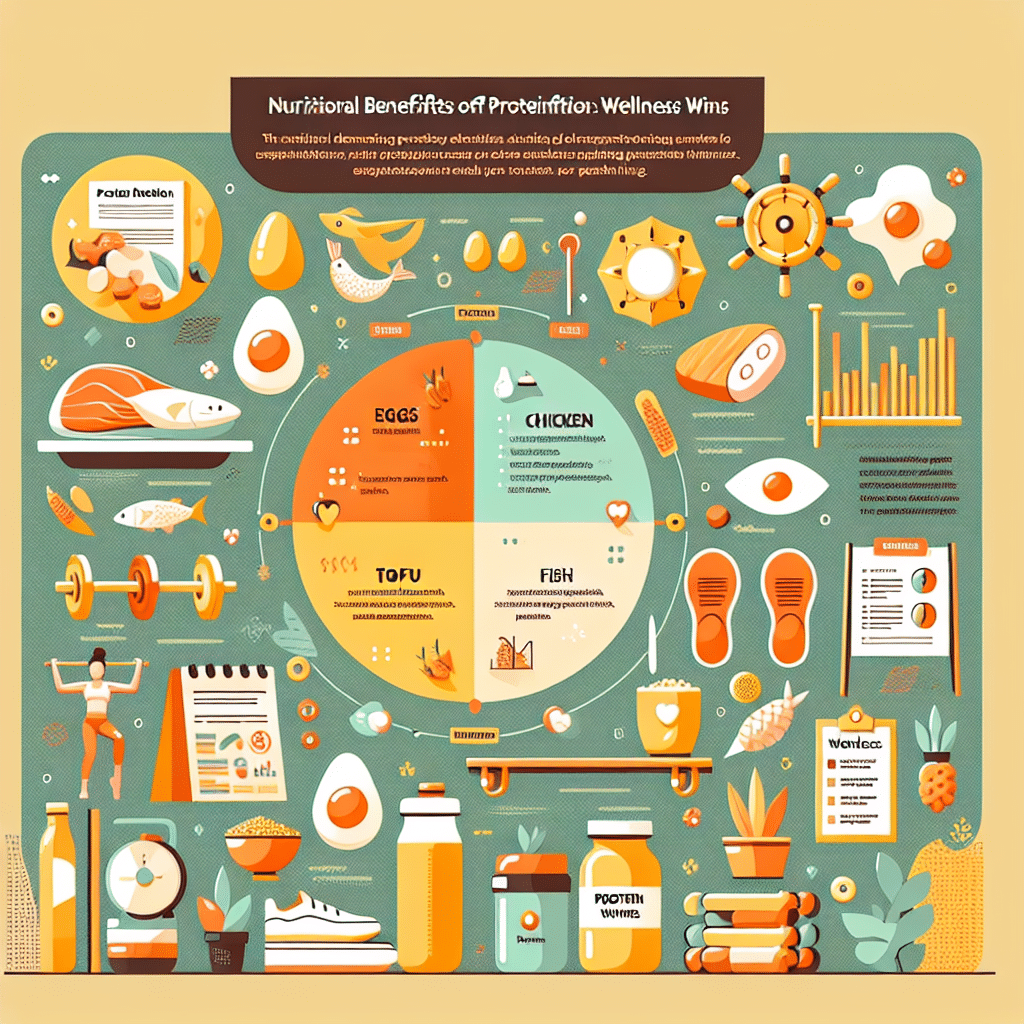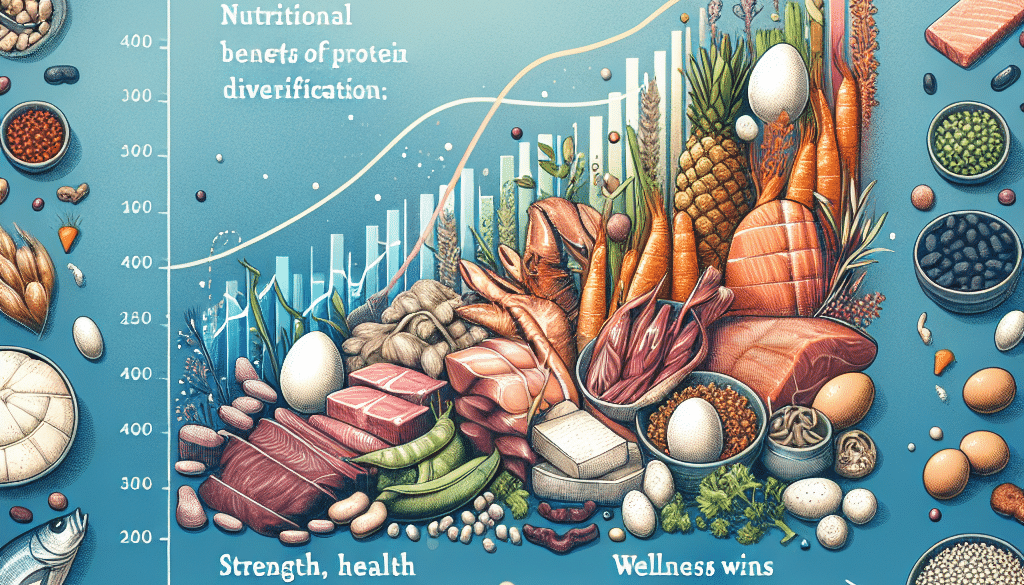Nutritional Benefits of Protein Diversification: Wellness Wins
-
Table of Contents
- Protein Diversification: Maximizing Nutritional Benefits for Wellness
- The Importance of Protein in Your Diet
- Benefits of Protein Diversification
- Exploring Protein Sources
- Case Studies and Statistics
- Practical Tips for Protein Diversification
- Conclusion: Embracing Protein Diversity for Optimal Health
- Discover ETprotein’s Premium Protein Products
Protein Diversification: Maximizing Nutritional Benefits for Wellness

Protein is a critical macronutrient that plays a vital role in the functioning of our bodies. It is the building block of muscles, organs, enzymes, and hormones, and is essential for growth, repair, and overall health. However, not all protein sources are created equal, and diversifying protein intake can lead to significant wellness wins. This article explores the nutritional benefits of protein diversification and how it can enhance your health and well-being.
The Importance of Protein in Your Diet
Protein is essential for the maintenance of body tissues, including the development and repair of muscles. It also plays a crucial role in immune function, hormone production, and the maintenance of lean body mass. The Recommended Dietary Allowance (RDA) for protein is 0.8 grams per kilogram of body weight per day for adults, but this amount can vary based on age, sex, and level of physical activity.
Benefits of Protein Diversification
Diversifying your protein sources can provide a wide range of health benefits. Here are some key advantages:
- Improved Nutrient Intake: Different protein sources offer various nutrients. For example, plant-based proteins typically provide fiber and antioxidants, while animal proteins are rich in vitamin B12 and iron.
- Reduced Disease Risk: Studies suggest that a higher intake of plant-based proteins may be associated with a lower risk of heart disease, hypertension, diabetes, and certain cancers.
- Enhanced Gut Health: Plant proteins often contain prebiotics, which feed the beneficial bacteria in your gut, improving digestion and overall gut health.
- Weight Management: Protein-rich foods can increase satiety, helping to control appetite and support weight management efforts.
- Sustainability: Incorporating more plant-based proteins can reduce your environmental footprint, as plant-based protein production typically requires fewer resources than animal-based protein production.
Exploring Protein Sources
There are numerous sources of protein, each with its unique nutritional profile. Here’s a look at some popular options:
- Animal-Based Proteins: These include meat, poultry, fish, eggs, and dairy products. They are considered “complete” proteins because they contain all nine essential amino acids.
- Plant-Based Proteins: Sources like legumes, nuts, seeds, and whole grains are excellent for those following vegetarian or vegan diets. While most plant proteins are “incomplete,” combining different plant sources can provide all essential amino acids.
Case Studies and Statistics
Research has consistently shown the benefits of protein diversification. For instance, a study published in the Journal of the American Heart Association found that participants who consumed more plant proteins had a lower risk of developing coronary heart disease. Another study in the Journal of Nutrition showed that a higher intake of plant-based proteins was associated with a lower body mass index (BMI) and reduced waist circumference.
Statistics from the National Health and Nutrition Examination Survey (NHANES) indicate that the average American diet is heavily reliant on animal proteins. However, there is a growing trend towards plant-based diets, with the plant-based protein market expected to reach $14.22 billion by 2025, according to a report by MarketsandMarkets.
Practical Tips for Protein Diversification
Incorporating a variety of protein sources into your diet can be simple and delicious. Here are some practical tips:
- Include a plant-based protein at every meal, such as beans, lentils, tofu, or tempeh.
- Snack on nuts and seeds or their butters for a protein boost.
- Experiment with protein-rich grains like quinoa, amaranth, or buckwheat.
- Try plant-based protein powders in smoothies or baking for an easy addition.
- Choose lean cuts of meat and opt for fish high in omega-3 fatty acids, such as salmon or mackerel.
Conclusion: Embracing Protein Diversity for Optimal Health
Protein diversification is not just a trend; it’s a sustainable approach to nutrition that offers numerous health benefits. By incorporating a variety of protein sources into your diet, you can improve nutrient intake, reduce disease risk, support gut health, manage weight, and contribute to environmental sustainability. Whether you’re a meat-eater, vegetarian, or vegan, there are plenty of options to help you achieve a balanced and healthful diet.
Discover ETprotein’s Premium Protein Products
If you’re looking to diversify your protein sources with high-quality options, ETprotein offers a range of organic bulk vegan protein and plant proteins to suit your needs. Their products, including Organic rice protein, clear rice protein, pea protein, clear pea protein, pumpkin seed protein, sunflower seed protein, mung bean protein, and peanut protein, are non-GMO, allergen-free, and have a neutral taste, making them perfect for various applications.
ETprotein caters to industries such as nutraceuticals, pharmaceuticals, cosmeceuticals, veterinary, and food and beverage. They are trusted by leading global brands and Fortune 500 companies, ensuring that you receive only the best quality products. To explore their offerings and how they can enhance your wellness journey, contact ETprotein and email sales(at)ETprotein.com today.
About ETprotein:
ETprotein, a reputable protein Chinese factory manufacturer and supplier, is renowned for producing, stocking, exporting, and delivering the highest quality organic bulk vegan protein and plant proteins. They include Organic rice protein, clear rice protein, pea protein, clear pea protein, pumpkin seed protein, sunflower seed protein, mung bean protein, peanut protein etc. Their offerings, characterized by a neutral taste, non-GMO, allergen-free attributes, cater to a diverse range of industries. They serve nutraceutical, pharmaceutical, cosmeceutical, veterinary, as well as food and beverage finished product distributors, traders, and manufacturers across Europe, USA, Canada, Australia, Thailand, Japan, Korea, Brazil, and Chile, among others.
ETprotein specialization includes exporting and delivering tailor-made protein powder and finished nutritional supplements. Their extensive product range covers sectors like Food and Beverage, Sports Nutrition, Weight Management, Dietary Supplements, Health and Wellness Products, and Infant Formula, ensuring comprehensive solutions to meet all your protein needs.
As a trusted company by leading global food and beverage brands and Fortune 500 companies, ETprotein reinforces China’s reputation in the global arena. For more information or to sample their products, please contact them and email sales(at)ETprotein.com today.














